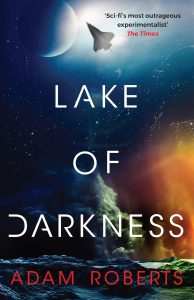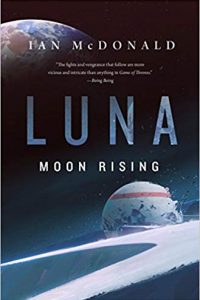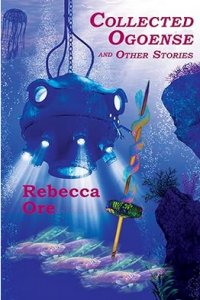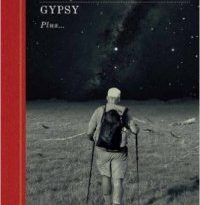Lake of Darkness by Adam Roberts: Review by Gary K. Wolfe
 Lake of Darkness, Adam Roberts (Gollancz 978-1-39961-767-3, £22.00, 320pp, hc) July 2024.
Lake of Darkness, Adam Roberts (Gollancz 978-1-39961-767-3, £22.00, 320pp, hc) July 2024.
Despite having won BSFA and Campbell Awards for his 2012 novel Jack Glass, Adam Roberts has a good case for being one of the most under-appreciated novelists in the UK – not a single Hugo or Nebula nomination in a career of more than two decades, according to the SFADB. As I and others have argued many times, awards don’t really measure anything other than the capacity to win awards, but I wonder if the eclectic intellectualism of much of his fiction, which draws not only on his encyclopedic knowledge of SF and its prehistory (his History of Science Fiction traces the genre back to 1600 or so), but on his cheerful appropriation of other genres as well (murder mysteries, adventure tales, philosophical tracts), and on his own fondness for fiercely thoughtful digressions exploring everything from hard-SF physics to principles of political and social organization, may seem challenging to casual readers. It’s enough to disorient the backseat-driver reader looking for only one thing, but it can be pretty rewarding for those willing to follow the ride.
His new novel Lake of Darkness, for example, begins as your standard Gothic space opera mass-murder first contact tale, and it’s genuinely suspenseful. Two faster-than-light “startships” are orbiting a black hole at a safe distance, when the captain of one of them, acting on messages from a mysterious “gentleman” who seems to be living inside the black hole, violently murders his entire crew. It’s not long before the crew of the other ship gets murdered as well, though the captain is eventually captured, and when a historian specializing in serial killers (interestingly, historians are the only ones in this future who can still read and write) tries to interview him, she seems infected by murderous impulses as well. While the horror/mystery plot wants to move the tale along briskly, the hard-SF elements want to explore the speculative physics of black holes, and, for a long chapter that seems almost dropped in from another novel, the engineering problems of a celebrity adventurer who wants to be the first human to walk on the solid metal core of a more-or-less Earth-like planet. And if that’s not eclectic enough, the novel is also an example of what the critic Tom Moylan once called the critical utopia, questioning the characters’ own views of their society and offering a whole satirical panoply of coinages like “desolatopia,” “committeetopia,” “hobbytopia,” “lobototopia,” and “infantopia.” Roberts is clearly fond of wordplay and literary allusions, from his title drawn from King Lear to occasional phrases dropped into the narrative from Yeats, Joyce, and others.
With that much to pack into a novel of fairly modest length, there would hardly seem to be much space left for character development, but in the final third of the novel, conflicts between characters are central, as the two most memorable figures in the entire book take center stage – a deliciously arrogant celebrity scientist named Gunnarsonsdottir and her long-suffering lover Joyns, who she treats dismissively even though Joyns is clearly the superior physicist. Roberts’s challenge in the final chapters is only partly to resolve puzzles and tie up threads – is the mysterious Gentleman who reappears a genuine alien intelligence or a sort of godlike cosmic horror? – but it also foregrounds these character conflicts, while leaving us with a whole range of classic SF speculative questions. Can information really escape a black hole? How would an advanced but postliterate society work? Can gravitational fields be manipulated through brilliant engineering? Why do celebrity scientists so often turn into assholes? One of the great pleasures of reading SF is watching writers take joy in their own ideas, and long after the grisly murders and space chases are left behind, Roberts makes it great fun to ponder such matters.
Interested in this title? Your purchase through the links below brings us a small amount of affiliate income and helps us keep doing all the reviews you love to read!


Gary K. Wolfe is Emeritus Professor of Humanities at Roosevelt University and a reviewer for Locus magazine since 1991. His reviews have been collected in Soundings (BSFA Award 2006; Hugo nominee), Bearings (Hugo nominee 2011), and Sightings (2011), and his Evaporating Genres: Essays on Fantastic Literature (Wesleyan) received the Locus Award in 2012. Earlier books include The Known and the Unknown: The Iconography of Science Fiction (Eaton Award, 1981), Harlan Ellison: The Edge of Forever (with Ellen Weil, 2002), and David Lindsay (1982). For the Library of America, he edited American Science Fiction: Nine Classic Novels of the 1950s in 2012, and a similar set for the 1960s. He has received the Pilgrim Award from the Science Fiction Research Association, the Distinguished Scholarship Award from the International Association for the Fantastic in the Arts, and a Special World Fantasy Award for criticism. His 24-lecture series How Great Science Fiction Works appeared from The Great Courses in 2016. He has received six Hugo nominations, two for his reviews collections and four for The Coode Street Podcast, which he has co-hosted with Jonathan Strahan for more than 300 episodes. He lives in Chicago.
This review and more like it in the September 2024 issue of Locus.
 While you are here, please take a moment to support Locus with a one-time or recurring donation. We rely on reader donations to keep the magazine and site going, and would like to keep the site paywall free, but WE NEED YOUR FINANCIAL SUPPORT to continue quality coverage of the science fiction and fantasy field.
While you are here, please take a moment to support Locus with a one-time or recurring donation. We rely on reader donations to keep the magazine and site going, and would like to keep the site paywall free, but WE NEED YOUR FINANCIAL SUPPORT to continue quality coverage of the science fiction and fantasy field.
©Locus Magazine. Copyrighted material may not be republished without permission of LSFF.






